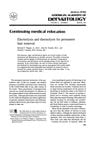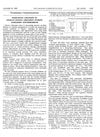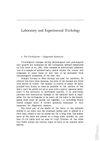Search
for
Sort by
Research
30 / 1000+ results
research Hair-Root Adaptation to Marasmus in Andean Indian Children
Children with marasmus have more resting hair follicles and thinner, less pigmented hair, showing long-term malnutrition.

research The Effect of Cyproterone Acetate on Hair Roots and Hair Shaft Diameter in Androgenetic Alopecia in Females
Cyproterone acetate effectively treats female hair loss by increasing healthy hair and decreasing unhealthy hair, but doesn't change hair thickness.

research Hair Root Studies in Patients Suffering from Primary and Secondary Syphilis
Syphilis patients showed abnormal hair root changes, with no difference between primary and secondary stages.

research Follicular Dysplasia and Hair Loss in White-Tailed Deer (Odocoileus Virginianus)
White-tailed deer can get a hair loss condition that might make them more vulnerable to environmental threats.

research Effect of Potassium on Blood Sugar and Plasma Insulin Levels in Patients Undergoing Peritoneal Dialysis and Hemodialysis
Potassium levels affect blood sugar and insulin during dialysis, and malnutrition changes children's hair roots.

research Hair Shaft Abnormalities: Clues to Diagnosis and Treatment
Hair problems can be caused by genetics or the environment, and treatment should focus on the cause and reducing hair damage.

research The Preventive Effect of Vitamin D3 on Radiation-Induced Hair Toxicity in a Rat Model
Vitamin D3 may protect rat hair follicles from radiation damage.

research The Effect of Topical Minoxidil Treatment on Hair Follicular Growth of Neonatal Hairless Descendants of Mexican Hairless Dogs
Minoxidil treatment can stimulate hair growth in hairless puppies if applied early.

research Electrolysis and Thermolysis for Permanent Hair Removal
The document concludes that electrolysis and thermolysis can permanently remove hair but calls for better regulation to ensure safety, and notes a possibility of hair regrowth and rare complications.

research Hair-Root Changes in Andean Indian Children During Marasmic Kwashiorkor
Malnourished Andean Indian children had abnormal hair roots compared to healthy children.

research Hair Biology and Nutritional Influences
Eating a balanced diet with the right vitamins and minerals is important for healthy hair, but too many supplements can be harmful.

research Hypotrichosis Congenita (KRT71 Mutation) in Hereford Cattle in Uruguay
A KRT71 mutation in Hereford cattle in Uruguay causes thin, curly hair and scaly skin.

research Noninflammatory, Nonpruritic Alopecia of Horses
Some horses lose hair without inflammation or itching due to various conditions, and while mainly a cosmetic issue, diagnosis requires examination and biopsies, and breeding is not advised if it's hereditary.

research Analysis of Microscopic Examination of Pulled Out Hair in Telogen Effluvium Patients
More atypical club hairs may indicate Telogen Effluvium.

research Laboratory and Experimental Trichology
The document concludes that the trichogram is a useful tool for diagnosing hair loss and suggests semi-organ cultures for practical trichological research.

research Hereditary, Congenital, and Acquired Alopecias in Dogs and Cats
The conclusion is that different types of hair loss in dogs and cats can be cosmetic or serious, and affected animals should not be bred.

research Targeted Skin Overexpression of the Mineralocorticoid Receptor in Mice Causes Epidermal Atrophy, Premature Skin Barrier Formation, Eye Abnormalities, and Alopecia
Overexpressing the mineralocorticoid receptor in mouse skin causes skin thinning, early skin barrier development, eye issues, and hair loss.

research Trichotillomania in Children: A Retrospective Study
Children with trichotillomania often pull hair from their scalp, and parents may not notice; stress can trigger it, and asking detailed questions helps in diagnosis and treatment.

research Canine Noninflammatory Alopecia: A Comprehensive Evaluation of Common and Distinguishing Histological Characteristics
Different types of dog hair loss are linked to problems starting the hair growth phase and early hair cycle ending.

research Graham Little-Piccardi-Lassueur Syndrome Associated with Androgen Insensitivity Syndrome (Testicular Feminization)
A woman had both Graham Little-Piccardi-Lassueur syndrome, causing hair loss, and complete androgen insensitivity syndrome, making her genetically male but physically female. This suggests androgens don't affect the hair loss condition.

research Follicular Dysplasia in Five Weimaraners
Five Weimaraners had a milder form of color dilution alopecia causing hair loss and skin issues.

research Alopecia Areata: Clinical Perspective and an Insight into Pathogenesis
Alopecia areata causes hair loss due to an immune attack on hair follicles, influenced by genetics and environment.

research Scalp Imaging Techniques
Different scalp imaging methods are important for studying hair and scalp health and require more volunteers for better evaluation.

research Disorders Causing Focal Alopecia
The document concludes that various disorders can cause hair loss in dogs, each requiring different treatments, and some may heal on their own.

research Hereditary, Congenital, and Acquired Alopecias
Different types of hair loss in dogs and cats have various causes and treatments, with outcomes ranging from good to uncertain.

research Diagnostic Exercise: Severe Bilaterally Symmetrical Alopecia in a Horse
A horse with severe hair loss was diagnosed with alopecia areata and a yeast infection.

research Male Pattern Androgenetic Alopecia
Androgens contribute to common male hair loss; more research needed for hair growth medication.

research Androgenetic Alopecia in the Pediatric Population: A Retrospective Review of 57 Patients
Alopecia common in teens, may indicate endocrine issue, minoxidil effective treatment.

research Epidermal Abnormalities and Increased Malignancy of Skin Tumors in Human Epidermal Keratin 8-Expressing Transgenic Mice
Mice with human skin protein K8 had more skin problems and cancer.